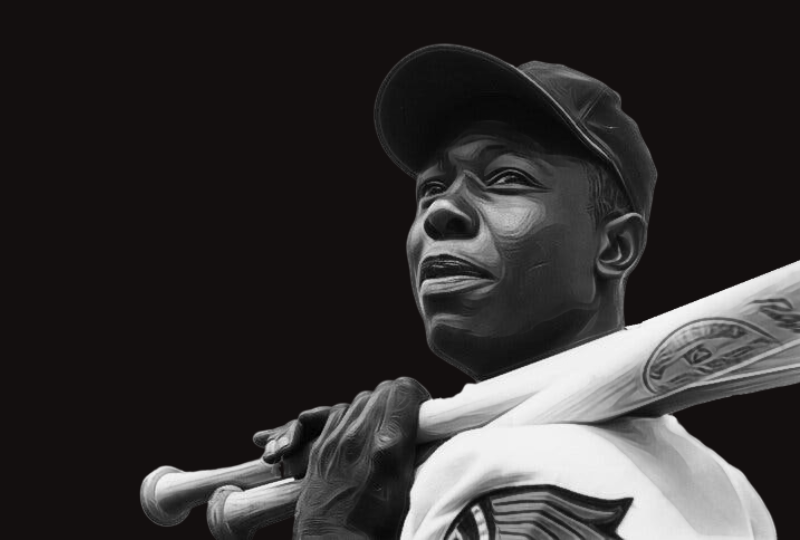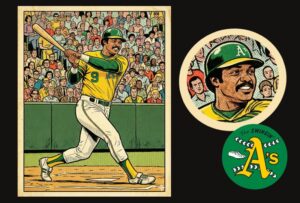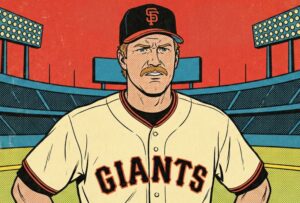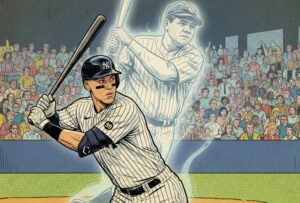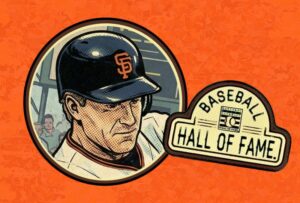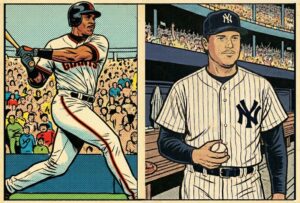When Henry Aaron sent a baseball over the left field wall in Atlanta on an April evening in 1974, he broke the most cherished record in baseball. As he arrived at home plate a few seconds later, among the pack of teammates who were there to greet him was his mother, who wrapped her arms around Aaron’s neck tight.
“I think my mother got to home plate,” Aaron said, “before I got to first base.”
The circle he ran around the bases that night, a journey he knew better than anyone to ever play the game, finished less as a joyous moment with his ballplaying peers, and more as a family celebration. There were probably countless thoughts rushing through Henry’s mind when he rounded the bases for home run #715, but one of them may have been a memory of the day he left home in Mobile, Alabama, to play professional baseball.
“I left with two-and-a-half dollars in my pocket,” Aaron said, “and my mother hugged me and said, ‘That’s all I have to give you. Be careful with it.’ “
Henry was careful. But he was also brave, courageous, and unshakeable. All those years later, with more weight on his frame, and immense pressure hanging over his head, Aaron may have smiled a bit when he felt his mother’s loving arms around him moments after he slugged #715.
“Thank god it’s over,” Aaron said into a microphone seconds later near home plate.
There is a tendency, when historians discuss the racism in baseball, to focus narrowly on Jackie Robinson. There is a tendency, when folks identify courage in the sport, to talk about Lou Gehrig, Roberto Clemente, and even Cal Ripken Jr. There is a tendency, when baseball experts debate the greatest to play the game, to elevate Willie Mays to the top of the discussion. But Aaron deserves (dare I say demands) to be considered on those accounts. Sadly, he has too often been ignored by a game that he gave so much.
Aaron grew up dirt poor in Alabama. His father worked as a sharecropper for a while, and young Henry was often at his side. When Henry was still a young child, he picked cotton to help earn enough money to put food on the family table. When he had time, he used a stray bat to hit bottle caps. He threw a tattered baseball and caught it barehanded until his mother was able to find a glove for him. This was during the Great Depression, and almost immediately, Henry was the most gifted player among those he played with in his neighborhood.
In 1951, when he was 17, Henry accepted $200 a month to play for the Indianapolis Clowns of the Negro American League. That’s when his mother tucked that $2.50 into his pocket and kissed him goodbye. That’s also when “Major League” Baseball was still overwhelmingly white. Robinson had debuted a few years earlier, but it wasn’t like things became equal overnight.
In 1952, Henry was offered a contract by the Boston Braves, and when he made his way up the ladder to get to the white big leagues, he encountered the racism that was prevalent at the time. As Aaron and his minor league teammates traveled through the south, the white players were able to stay in nice hotels and eat in any restaurant. But Aaron and other black players could not. Despite the bigotry, Henry won the South Atlantic League MVP award. One sportswriter quipped that “Henry Aaron led the league in everything except hotel accommodations.”
Aaron debuted with the Milwaukee Braves in 1954, seven years after Robinson had made it possible for blacks to play in the major leagues. But while more black players and dark-skinned Latinos were coming into the league, racism didn’t disappear. In the ensuing years as he became one of the game’s greatest players, his stature didn’t, in the eyes of many white Americans, make him an equal.
Henry Aaron (he never liked being called “Hank”) wasn’t smiling and gregarious on the ballfield, or off it for that matter. With the way he and other black players were treated, he saw little reason to smile.
“I was serious,” Henry said, “and playing ball was something I had to do to prove myself in this world.”
Even as he added to his great playing record, Aaron somehow seemed to be in the background. Mays made great catches that “looked like an optical illusion.” Meanwhile, Aaron played great, but understated defense. “I never felt like I had to chase a baseball that was going to land twenty rows in the stands,” Henry said.
When the Braves won the World Series, Henry was still a relatively young star, and he won it in Milwaukee, a white, midwestern city far from the shiny lights of New York. The Yankees won practically every year, and baseball celebrated the heralded trio of Willie, Mickey (Mantle), and the Duke (Snider). While black stars were for the most part, in the chorus.
By the time he was in Atlanta, smacking more home runs and inching his way to 400, 500, and then 600 home runs, baseball was moving him from the overlooked category to the slugger category. As he added weight to his body, Aaron was suddenly a home run hitter. Before Atlanta, he had won only two home run titles, but now he was classified as a one-trick pony.
The greatest home run hitter of all-time never thought of himself as a home run hitter. And if anyone should know, it was Aaron. For the first dozens seasons he was in the league, Aaron weighed about 175 pounds. He was lean, with broad shoulders and strong legs. His most distinguishing feature as a batter were his wrists. His bat speed and ability to get his wrists through the strike zone were legendary.
“Trying to throw a fastball past Hank was like trying to sneak the sunrise past a rooster,” said a teammate.
And so, as he soared past 650 homers and approached 700, Aaron morphed into a caricature, a convenient stereotype.
Then there was the racism and the threats of violence that increased as Aaron moved closer to 714 home runs. Letters, thousands and thousands of letters, that poured into the Braves, filled with the ugliest, most vile threats. Aaron read them, and read probably too many of them. There were death threats, from fans who didn’t want a “nigger” to break Babe Ruth’s record. For nearly two years, Henry was shadowed by an armed bodyguard. He often wondered, as he crouched in the on-deck circle waiting his turn at bat, if some maniac with a high-powered rifle would kill him on the baseball field.
Through all of this, Aaron showed up and did his job. He played baseball as well as anyone ever had. He kept being named to All-Star teams (25 in all), and he won the home run title in each of his first two seasons in Atlanta, when he was 32 and 33 years old. Perhaps most strikingly, Aaron made great pitchers look like bums. Against Sandy Koufax, the man dubbed “The Left Arm of God,” the author of four no-hitters, Henry batted .362, making the southpaw look like a bush leaguer. Aaron clubbed 17 home runs off Hall of Famer Don Drysdale, and he even seemed to defy age. From the age of 35 to 40, while Mays was aging his way out of the game, and his peers were retiring, Aaron’s slugging percentage ranked third in the game.
The relief that Aaron felt when his chase of 714 was finally over must have been liberating. But, the thing is: Aaron was a sensitive man, and the threats and hatred he felt, that had piled on him from being a poor boy in Mobile to being “just another nigger” in the south as a minor leaguer, to being “that black bastard” who was threatening to beat Ruth’s record, it continued to feel heavy on his shoulders, even after he retired. He struggled to find a job in the game, like an outcast, and his iconic status was ignored by MLB for more than twenty years until they famously (finally) celebrated Henry in 1999 with an award in his honor. Through it all, even as Aaron mellowed, he still felt the sting of the hatred and racism.
Aaron gave most of the memorabilia from his playing career to the Baseball Hall of Fame, but he held on to a few items. The things he saved are telling.
“I kept [some of the hate letters],” Aaron admitted years after breaking Ruth’s record. “I still have some of them, and what they say about us, as Americans, it makes me sad.”
Aaron wasn’t Jackie Robinson, and he wasn’t Roberto Clemente. He wasn’t Babe Ruth either, of course. But he didn’t have to be, because being Henry Aaron was so monumental. Ballplayer, role model, champion: Aaron was all of those things.
“I never wanted them to forget Babe Ruth,” Aaron said. “I just wanted them to remember Henry Aaron.”

